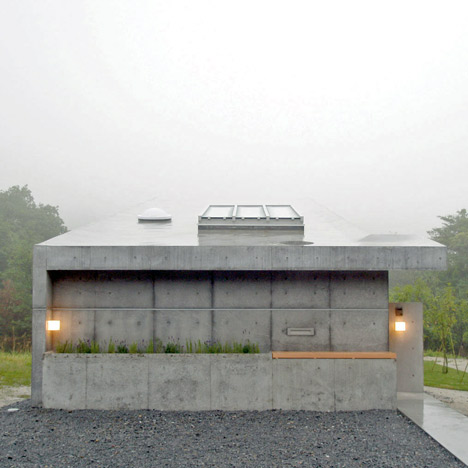This concrete house in Hiedaira, Shiga Prefecture, Japan, by Kyoto firm Thomas Daniell Studio, is located next door to the house and studio we published on Dezeen last week (see our earlier story here).
The entire building is made of exposed reinforced concrete, including the gabled roof, which has been treated to make it waterproof.
Built on a sloping piece of land, the house is a single storey at the front and expands into two stories at the rear.
Large windows in the bedroom and living room provide views of the surrounding landscape, which includes a national park.
All our stories featuring Japanese houses »
More residential architecture on Dezeen »
The following information is from the architects:
HOUSE IN HIEIDAIRA
This is a single-family house designed for a lush natural setting a new subdivision in the mountains above Kyoto.
The site slopes away to the north, facing onto a National Park, with a view across a forest toward Mt Hiei (the most sacred mountain in Japanese Buddhism).
In compliance with new building regulations that mandate orthogonal walls and gabled roofs, the house takes the form of a nagaya (traditional row house): a linear sequence of rooms contained in a long, narrow volume aligned perpendicular to the street.
The house expands in section to follow the slope: single-story at the street façade, expanding to two stories at the rear of the site.
This allows the gabled roof shape to define the interior spaces rather than simply sit on top of them. The bedrooms are half buried, whereas the living area is oriented toward the mountains.
The historical nagaya type is a response to the narrow, deep sites in congested inner-city Kyoto, with little or no space between buildings, but in this semi-rural location the lot has been divided in half longitudinally, with building and garden set parallel and having approximately the same width and footprint.
The rooms are arranged as a band running along the western edge of the site, enabling natural light penetration into each room.
The location of the building gives maximum separation from the neighbor to the east, and hence maximum sunlight in the garden area that remains.
The overall nagaya form remains as abstract as possible, made entirely from bare concrete.
The roof has no cladding or surface membrane (an invisible waterproofing compound has been applied to the exposed slab) and there are no projecting eaves, making the house volume akin to something sliced from a block of tofu.
There are no drains, downspouts, or gutters -- or more precisely, the entire roof plane has been subtly shaped to become an enormous rainwater channel.
The roof perimeter slopes gently upwards, creating subtle parapets that prevent water from falling down the long walls, channeling it all to the building’s north and south ends where it may fall freely to the ground.
Architect: Thomas Daniell (assistants: Fumihiko Nakamura, Mike Heighway)
Click for larger image
Contractor: Shimizu Corporation
Location: Hieidaira, Otsu City, Shiga Prefecture, Japan
Click for larger image
Program: Single family house (2 adults, 2 children)
Area: 136m2 (two stories)
Click for larger image
Construction: September 2008-May 2009
Structure: reinforced concrete
See also:
.
| House in Hieidaira by Tato Architects |
Himeji Observatory House by KINO architects | A House Awaiting Death by EASTERN Design Office |

